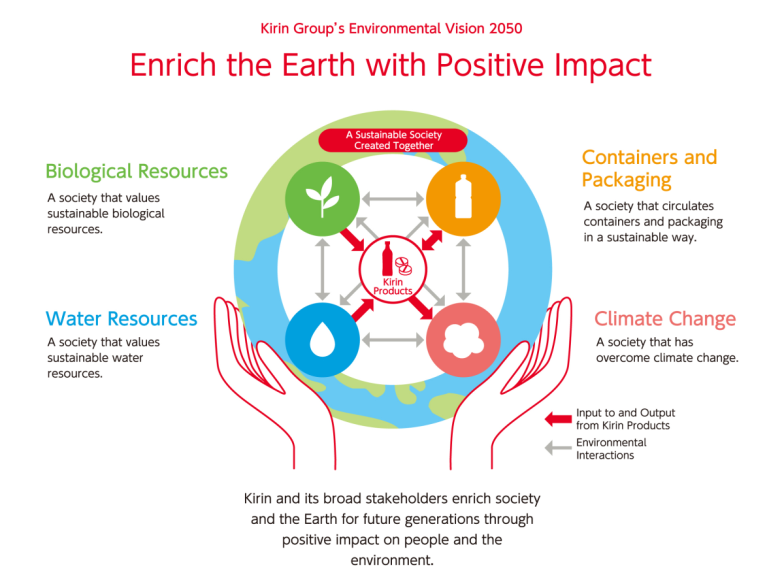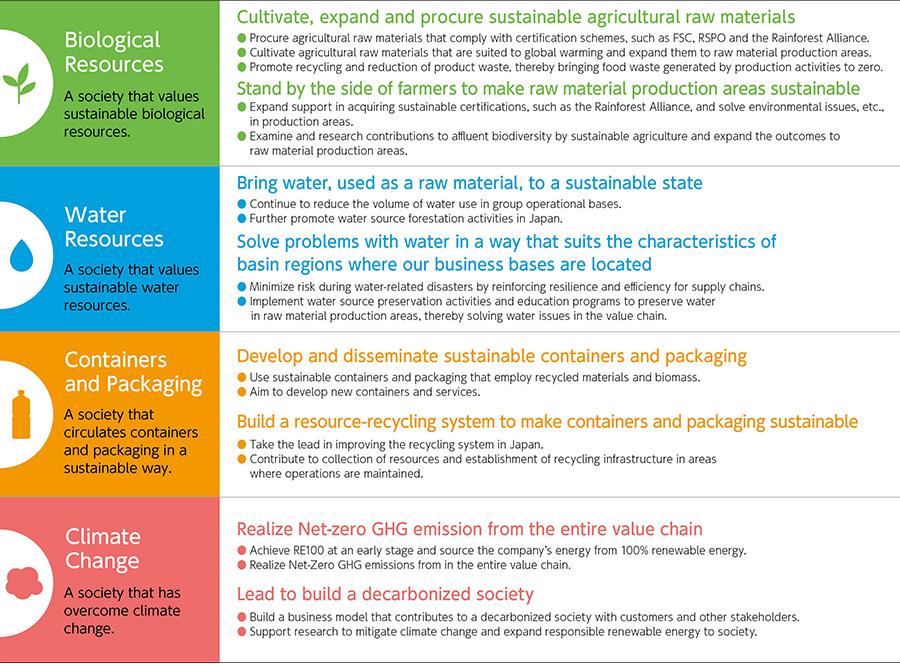Kirin Group's Environmental Vision 2050
Enrich the Earth with Positive Impact
Efforts for Realization
Against the backdrop of the climate crisis, the ongoing loss of biodiversity, and the increasing severity of global environmental problems such as ocean pollution caused by plastics, society is approaching a major turning point. Industries such as Kirin Group that rely on water, agricultural products, and other blessings of nature are vulnerable to climate change, and must move quickly to overcome these issues. In scenario analysis based on the TCFD final report, which we have been conducting since 2017, we have seen the enormous scale of the impact of climate change on agricultural products and water resources, and it has become clear that minimizing and neutralizing negative impacts will not be sufficient to limit the impact on natural capital and deliver a sustainable planet to the next generation. We also expect that corporate environmental initiatives will evolve from being self-contained to having a positive impact on wider society. In order to meet these demands from society, we have further developed our existing holistic approach to the environment with the Kirin Group’s Environmental Vision 2050, which the Board deliberated, resolved, and renewed in 2020, as well as the “positive impact” approach that we have newly introduced. With regard to renewable energy sources, we prioritize "additionality," i.e., contributing to the decarbonized society by adding and increasing renewable energy in the world. We aim to build a “society that continuously recycles plastics” by developing our own commercialization techniques for chemical recycling. With regard to natural capital, we aim to be "nature positive," whereby the expansion of our businesses will contribute to the restoration of ecosystems and increase of their services. Under this new vision, together with the young people who will lead the future, we will create a prosperous world for the next generation.
Performance Highlights (Environmental Value Created in 2022)
The Kirin Group was a global pioneer in disclosing information on a trial basis based on the "LEAP" approach advocated in the beta v0.1 of the TNFD framework in 2022. As one of four companies selected from around the world in March 2023, Kirin is leading the world in the disclosure of non-financial information related to natural capital, such as testing scenario analysis methods with TNFD members. In addition, we continue to receive high praise for our TCFD-compliant disclosure, including receiving the highest number of votes for “excellent TCFD disclosure” selected by the GPIF's domestic equity asset management institutions for the second consecutive year. Over more than three years, the spread of COVID-19 has had a significant impact on the Kirin Group's progress in resolving environmental issues. Strict restrictions on going out continued in Sri Lanka, meaning that trainers were mostly unable to travel to farms. Under these conditions, the government abruptly declared a ban on the use of chemical fertilizers and pesticides, which, combined with the subsequent economic collapse*1 A target to effectively conserve at least 30% of land and sea areas as healthy ecosystems by 2030, with the goal of halting and reversing biodiversity loss by the same year. It was adopted as a new global target at the Fifteenth meeting of the Conference of the Parties (COP15) to the Convention on Biological Diversity held in December 2022. *2 An acronym for Other Effective area-based Conservation Measures, which are geographically defined areas other than Protected areas, such as national parks, but that can effectively conserve biodiversity over the long term. Such areas can be included when achieving numerical targets under 30by30 targets.*3 For details on calculation boundaries for each type of performance data, etc., see the content of our activities in Sri Lanka, forced a long period of stagnation in efforts to support the acquisition of sustainable farming certification and conserve water sources within farms. Even under these difficult circumstances, the Kirin Group continued to support the acquisition of certification, while the Rainforest Alliance and local trainers did their utmost to ensure that the farms continued to grow tea. Following the declaration of WHO of the end of the global emergency over COVID-19, we will resume our activities in earnest, and will also discuss new measures to support small farms with the Rainforest Alliance, which we plan to announce later this year. Ongoing ecological research since 2014 has scientifically demonstrated that the Château Mercian Mariko Winery in Ueda City, Nagano Prefecture, has achieved Nature Positive status by transitioning from idle, devastated land to hedge and grass cultivation, and the results were presented at COP15 in 2022. We are also engaged in procedures aimed at contributing to the OECMs*1 of the new global “30by30”*2 goal. The ratio of recycled resins used in PET bottles for containers and packaging in fiscal 2022 was approximately 1.7 times higher than previous year. Our plan to achieve practical uses for chemical recycling is making progress, and we believe we will be sufficiently able to achieve our target of 50% by 2027. We already use 100% FSC-certified paper for paper containers in Kirin Brewery, Kirin Beverage, Mercian, and together with our efforts related to PET bottles, we will contribute to the creation of the circular economy. From 2021 to the first half of 2023, the Kirin Group has been accelerating measures to install large-scale solar power generation facilities at breweries and plants, and to make the electricity purchased at breweries and plants 100% renewable. By the end of 2023, we expect 43% of the electric power used by Kirin Brewery to come from renewable energy, and we also expect Kyowa Kirin to reduce its CO2 emissions by 53% compared with 2019. As energy prices soar as a result of rising demand for energy caused by economic recovery from the spread of COVID-19 and the geopolitical impact since February 2022, we will turn this risk into an opportunity, and lead the creation of a decarbonized society.
- A target to effectively conserve at least 30% of land and sea areas as healthy ecosystems by 2030, with the goal of halting and reversing biodiversity loss by the same year. It was adopted as a new global target at the Fifteenth meeting of the Conference of the Parties (COP15) to the Convention on Biological Diversity held in December 2022.
- An acronym for Other Effective area-based Conservation Measures, which are geographically defined areas other than Protected areas, such as national parks, but that can effectively conserve biodiversity over the long term. Such areas can be included when achieving numerical targets under 30by30 targets.
- For details on calculation boundaries for each type of performance data, etc., see the content of our activities, P4, P41-75.
https://www.kirinholdings.com/en/investors/library/env_report/


